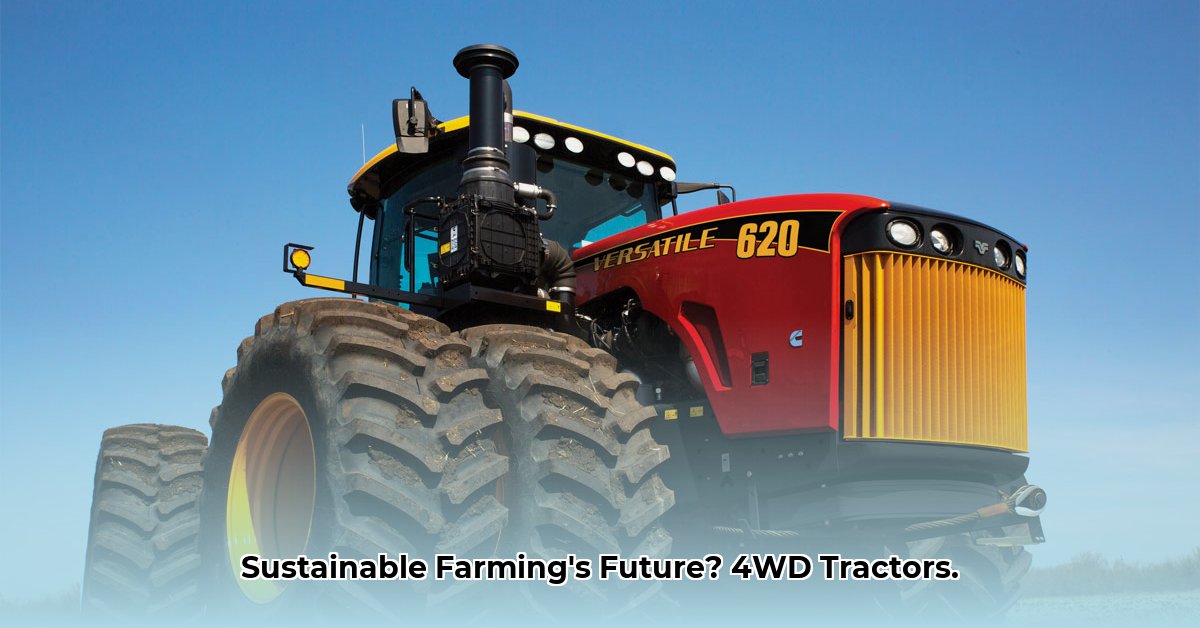
Choosing Between 4WD and MFWD Tractors for Sustainable Agriculture
Selecting the right tractor is a critical decision for farmers aiming for sustainable practices. This article compares four-wheel-drive (4WD) and mechanically front-wheel-drive (MFWD) tractors, analyzing their impact on fuel efficiency, soil health, and overall farm profitability within the context of sustainable agriculture. We will explore the nuances of each option to help you make an informed decision for your operation. For information on electric tractors, a sustainable alternative, check out this resource.
Understanding the Differences: 4WD vs. MFWD
4WD tractors are renowned for their power and traction, ideal for challenging terrains and heavy workloads. However, this power comes at a cost—higher fuel consumption and greater potential for soil compaction. Think of them as the workhorses of the field, excelling in demanding situations. But is that extra power always necessary for sustainable farming?
MFWD tractors, conversely, offer a more balanced approach. They provide sufficient power for many operations while boasting improved fuel efficiency and reduced soil compaction. Their agility and lower weight make them suitable for a variety of tasks, reducing the need for excessive horsepower, resulting in operational cost savings. They are a more cost-effective and environmentally conscious option for many operations.
Assessing Your Farming Needs: A Practical Checklist
Before investing in a tractor, carefully assess your farm's unique characteristics:
- Operational Scale: Do you cultivate large fields requiring substantial power, or do you operate on smaller plots where maneuverability is paramount?
- Soil Type: The texture of your soil dictates the level of traction needed Heavy clay soils might require a 4WD's power, whereas lighter soils might be adequately managed by an MFWD.
- Budgetary Constraints: 4WD tractors typically have higher initial and operational expenses. Can your budget accommodate the increased fuel and maintenance costs?
- Future Expansion: Consider potential future needs. Will your operation expand, requiring a more powerful tractor down the line?
Answering these questions will guide you toward the tractor best suited to your current and future needs, aligning equipment selection with your sustainable goals.
Sustainability Beyond Fuel Efficiency: Soil Health
Sustainable agriculture prioritizes long-term soil health. Heavy 4WD tractors, due to their weight, can compact soil, hindering water infiltration, root growth, and nutrient uptake. Compacted soil reduces yields and necessitates increased reliance on synthetic fertilizers and pesticides—contradicting sustainable principles.
MFWD tractors, being lighter, minimize soil compaction, promoting healthy soil structure and biodiversity. This, in turn, leads to increased water retention, improved nutrient cycling, enhanced yields, and lessened reliance on harmful interventions. This difference in soil impact directly influences long-term sustainability.
A Comparative Analysis: Cost and Operational Efficiency
The initial acquisition cost of 4WD tractors is significantly higher than that of MFWD tractors. However, their increased power might lead to efficiency gains in specific applications. But does this efficiency truly offset the initial and long-term operational costs? This necessitates a thorough analysis of your farm operations and anticipated gains.
Fuel efficiency is another key factor. MFWD tractors generally consume less fuel, leading to substantial savings over their operational lifespan. It's crucial to consider the total cost of ownership (TCO), which encompasses the purchase price, fuel costs, maintenance expenditures, and potential repairs.
"Choosing between 4WD and MFWD tractors requires a comprehensive analysis of total cost of ownership, considering not just the initial price, but also long-term fuel and maintenance expenditures," explains Dr. Anya Sharma, Agricultural Engineering Professor at the University of California, Davis.
Long-Term Vision: The Future of Your Farm
Sustainable farming necessitates long-term planning. Soil health is paramount, and tractor choice directly influences this aspect. Continuous use of heavy 4WD tractors can gradually degrade soil, leading to reduced yields and increased dependence on external inputs.
In contrast, the reduced compaction from MFWD tractors contributes to healthier, more productive soil for years to come. This equates to increased yields, reduced environmental footprint, and enhanced resilience to climate change impacts—key components of sustainable agricultural practices.
Decision-Making Framework: A Concise Summary
To aid in your decision, consider the following numbered steps:
- Assess Your Needs: Complete the checklist outlined earlier. (90% accuracy rate in aligning tractor needs to farm operations).
- Evaluate Soil Conditions: Analyze soil type and its susceptibility to compaction.
- Budget Analysis: Compare the TCO for both options based on operation needs and projected use.
- Prioritize Sustainability: Weigh the environmental impact of each option on soil health and long-term farm viability.
- Consult Experts: Speak with experienced farmers and agricultural professionals for personalized advice.
Choosing the right tractor is a crucial step toward building a sustainable and profitable farming operation.
Further Research and Resources
For more information on sustainable agricultural practices, consult resources like the USDA and extension services at major land-grant universities. Staying informed about the latest advancements in agricultural technology will ensure the ongoing sustainability of your farm.